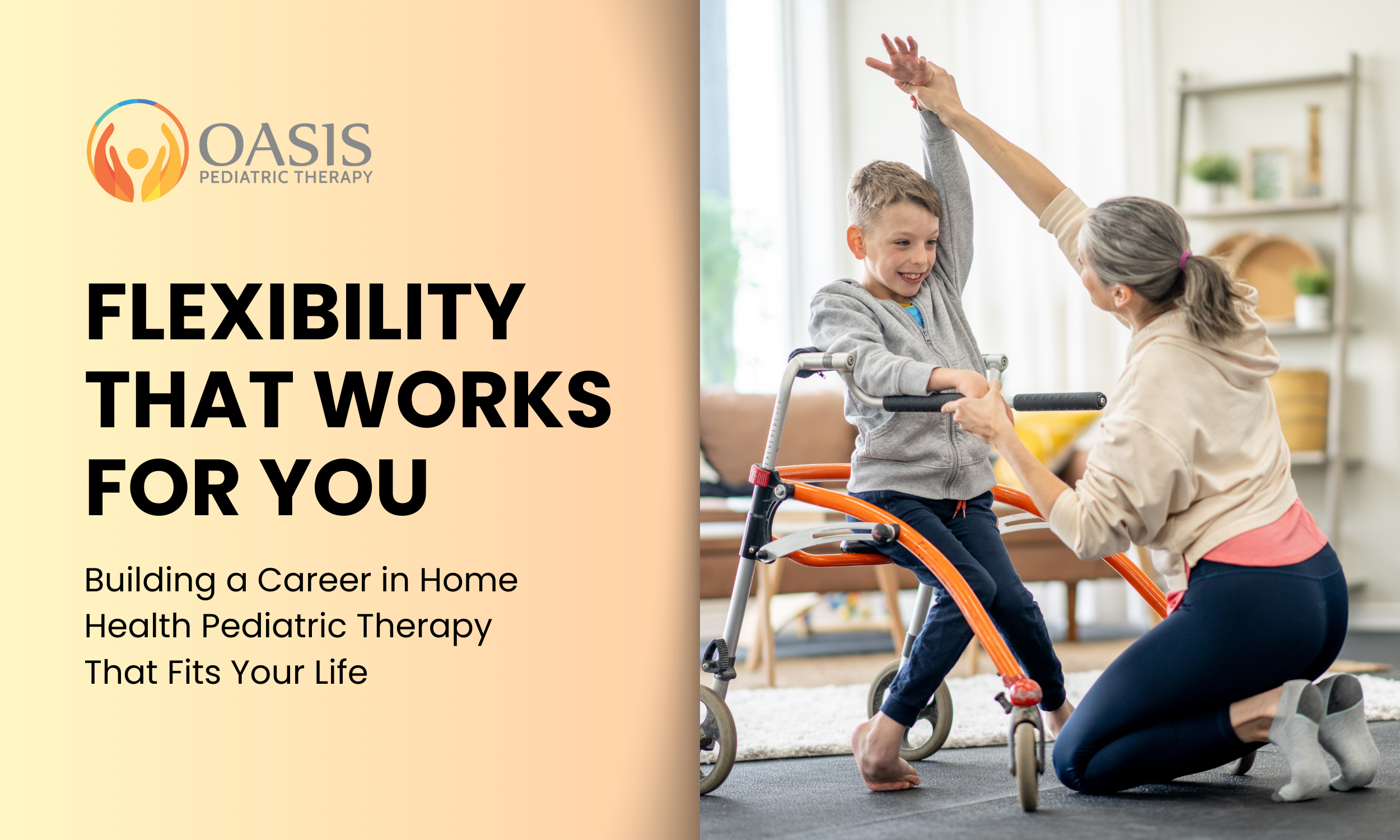Flexibility That Works for You: Building a Career in Home Health Pediatric Therapy That Fits Your Life
Imagine starting your morning by dropping your kids off at school, then heading to a therapy session with a family who greets you at their doorstep. By the afternoon, you’ve wrapped up documentation and still have time to pick the kids up from school and make it to your evening plans.
For many OTs, PTs and SLPs, creating true work-life balance can be a challenge in certain settings. Home health offers a different kind of flexibility. One where clinicians have more choice in shaping their schedules and caseloads. At OASIS Pediatric Therapy, that flexibility is part of how we support our team.
Our home health pediatric therapy model gives clinicians autonomy, flexibility and support so they can build careers that complement their lives, not compete with them. Whether you’re looking for full-time or part-time work, early mornings or afternoons, OASIS makes it possible to design a schedule that fits your life while still delivering the high-quality care children deserve.
What Flexibility Looks Like at OASIS
At OASIS, flexibility isn’t an afterthought. It’s the foundation. Because we’re therapist-owned, we understand firsthand the importance of balance. Our leadership team has walked in your shoes, and they’ve built a model that supports autonomy without sacrificing collaboration.
Abby Bohall, SLP
Clinicians in home health at OASIS design their caseloads in a way that reflects their lifestyle. Want to cluster appointments based on location so you aren’t driving all over the Denver area daily? Interested in growing your caseload gradually as you transition from graduate school to full-time work? At OASIS, those options are real.
I drop off and pick up my children every day for school. So that is wonderful. It is nice to have that option where I can still participate in my career but also have a good balance with my kids and being at home. We are in charge of our schedule versus at a clinic or a school where patients are going to be there, and you need to show up.” - Abby Bohall, Speech Language Pathologist at OASIS
This flexibility benefits not only clinicians but also patients. Our patients and their families thrive when our clinicians are supported. By giving our home health team the ability to work in a way that fits their lives, we ensure consistency, reliability and joy in the therapy process.
“Our leadership team does a really good job of checking in and doing yearly reviews. It’s not just like ‘you saw this many patients’ type of review. They ask, “How are you doing? Is this working for you?”- Abby Bohall, Speech Language Pathologist at OASIS
The result is a team that shows up for families with energy, purpose, and the support they need to thrive.
Balancing Independence and Collaboration
Autonomy is one of the most significant benefits of pediatric therapy home care. Clinicians bring therapy into children’s natural environments, helping families integrate strategies into daily routines. For families, this means progress happens not just in sessions but in real life. For clinicians, it means building flexible, meaningful workdays.
But at OASIS, autonomy never equals isolation. We’ve built systems to ensure clinicians feel supported and connected, even when they’re working independently in the field. There are numerous opportunities for mentorship, leadership development and monthly team bonding. Mentorship programs provide both new and seasoned clinicians with the opportunity to learn and grow together. We help offset the cost of continued education completed through OASIS. Monthly team gatherings are opportunities to share case studies, brainstorm strategies and connect with peers.
Leadership has set up a platform for daily communication between clinicians in their discipline as well as other therapy disciplines. This platform enables clinicians to share ideas, find coverage if needed and collaborate with other disciplines to gain perspective on all the decisions affecting their patients.
“It is really nice to work closely with the PTs and OTs. A lot of times we’ll have a patient with more than one service and are also involved in other therapy disciplines. Working in a team environment, I’m getting more perspective on how all the decisions and disciplines fit together. I can get the full picture of what is going on for the other services. I feel I can help the child as a whole.” - Abby Bohall, Speech Language Pathologist at OASIS
This balance of independence and connection is what makes OASIS unique. Home-health clinicians enjoy the freedom to manage their own schedules, with the reassurance of knowing they have a team standing behind them.
Our Values in Action
Flexibility works best when it’s guided by strong values. At OASIS, our core values shape every decision, interaction and schedule we create:
Integrity: honoring commitments to both clinicians and families.
Communication: speaking openly, kindly and respectfully, especially about workload and caseload needs.
Unity: connecting as a team through mentorship and daily communications.
Consistency: ensuring reliability in both therapy and support.
These values aren’t just words on paper. They’re how flexibility becomes reality. Leadership listens to clinicians’ needs, communicates clearly and fosters a culture where you can trust that your work-life balance will be respected. That’s what makes OASIS different from other organizations, where schedules are rigid and clinician voices can be overlooked.
Why Flexibility Matters
Flexibility at OASIS isn’t just a perk; it’s part of our culture. Clinicians who have balance are able to manage their work in a way that fits their lives. Families benefit from having therapists who are supported and consistent. Clinicians benefit from knowing their personal and professional needs are both respected.
One of Abby Bohall’s patients was almost three and still hadn’t spoken any words. Abby recognized that he was trying to vocalize and introduced an Augmentative and Alternative Communication (AAC) device. To her amazement, the child picked it up immediately, quickly learning to share what he wanted and needed. With the right tool, he began communicating simple but life-changing phrases with his mom, from “I want a snack” to “I love you.”
“All this child needed was the opportunity. It was amazing to be the one who gave him a voice while he continued working on his speech.” - Abby Bohall, Speech-Language Pathologist at OASIS
Every story of a child learning to walk, speak or gain independence reminds us that thriving clinicians create thriving families. By empowering our team with flexibility, OASIS ensures that our mission, to joyfully serve families so children can thrive, is lived out every day.
Your Ideal Career
At OASIS, we believe a fulfilling career should fit into your life, not the other way around. That’s why we offer:
Full-time and part-time opportunities.
Scheduling built around your lifestyle.
Autonomy paired with mentorship and collaboration.
Leadership that understands because they’ve been there.
A fun, supportive team culture rooted in values.
“OASIS provides flexibility, mentorship and support. I switched to early intervention home health because of my own child’s needs. But I’ve stayed with it because I love partnering with the families and having them be right there and get to educate the parent on the therapy and techniques so that they can use them when we’re not there.” - Abby Bohall, Speech Language Pathologist at OASIS
If you’re ready for autonomy, balance and growth, OASIS home health division is ready for you.
Want to be part of a mission-driven team that empowers children and families to thrive?
Join OASIS today. Apply now.




